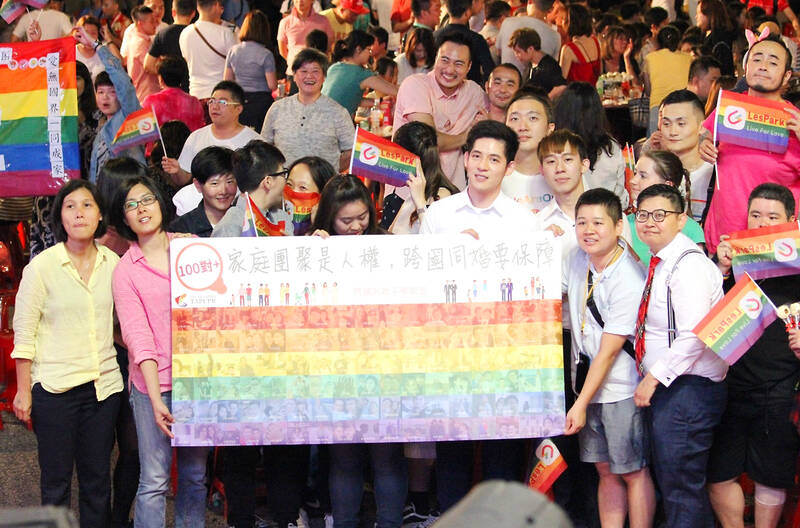When Sara (names in this story are changed to protect the sources’ identities) takes her daughter April out anywhere in Taiwan, she’s frequently asked the same question: “Is your husband Taiwanese?”
Sara is white, and April has unmistakably Asian features.
“My wife is Taiwanese,” she replies.

Photo: Tien Yu-hua, Taipei Times
If asked, she may then clarify that April is her biological child, Taiwanese by blood, and has two moms.
This often creates more confusion, but it is a difficult reality for Sara, her wife Dana and April. While Dana has adopted April, the child does not have Taiwanese (Republic of China) nationality despite both of her parents’ desire that April grow up Taiwanese.
It is also the issue behind a lawsuit they filed against the Ministry of the Interior (MOI), with the help of the Taiwan Alliance to Promote Civil Partnership Rights (TAPCPR). The government has repeatedly refused to recognize April’s right to citizenship, which her parents feel she has had since birth.

Photo courtesy of TAPCPR
The obstacle set by the MOI isn’t that Sara is an American citizen, nor is it that April is not Dana’s biological child. The only issue is that they are a same-sex couple.
If a heterosexual married couple has a child, and one parent has Taiwanese nationality, the government considers that child to be a citizen as well. In other words, if Sara were married to a Taiwanese man at the time of April’s birth, but April was not that man’s biological daughter, the MOI would still consider him the father, and April Taiwanese from birth. It wouldn’t even be a question.
In fact, Sara and Dana feel that adoption shouldn’t have been necessary, per se.
“Heterosexual couples who use donors to conceive don’t have to go through the adoption process,” Sara said. “I’ve always wanted to have a baby, and Dana wanted to [as well] … but I feel they don’t see Dana as a legitimate parent.”
CONTRADICTING RESPONSES
When Sara and Dana set out to conceive, they inquired initially about whether their child would be able to claim Taiwanese citizenship. They met with a lawyer and even asked the MOI, and were led to believe that Sara carrying the child, with Dana as an adoptive parent, would be possible.
“We talked through everything to make sure we had all our ducks in a row,” Sara said. “We knew it was going to be a thing.”
As IVF remains illegal for same-sex couples in Taiwan, many go abroad to access such treatments. Sara and Dana chose an at-home option with a private donor, a Taiwanese man in their social circle whom they trusted and who was willing to help.
Once April was born, the family was given very different answers. According to the MOI, Sara being American on a spousal visa and Dana being an adoptive parent rendered April as an American, not Taiwanese.
This is the answer they received at every turn. First, Dana got a call from the government informing Dana that her baby had not yet been registered as a foreigner. Dana informed them that April was not a foreigner; once she was adopted she’d be Taiwanese.
“They were like, no, she won’t,” Sara explained. “They said she’s American [and] under Taiwanese law, if you qualify for a nationality then you are that nationality. April qualifies for US nationality, so in Taiwan’s eyes she’s American.”
The adoption was approved soon after, which required classes and court appearances for Dana, a home visit and criminal and financial checks. First, they applied to the Taipei City Government for the childbirth subsidy new parents receive, but were rejected as April and Sara are listed as a foreign spouse and child on Dana’s household registration.
The official rejection came in May, and their lawyer drafted a letter to the MOI in June.
“[Our lawyer] argued that under Taiwan’s current law, April is Taiwanese. Taiwan’s current law says if at the time of birth you have a Taiwanese parent, you are Taiwanese. And arguably, you could and should say that at the time of birth, April had a Taiwanese parent, because Dana has been her parent. Before she was conceived, Dana was her parent.”
The next rejection was almost immediate: the MOI replied that as they consider April a foreigner, the parentage issue is not within their area of purview. This is when Sara and Dana began their lawsuit, claiming essentially that as April has the right to Taiwanese nationality from birth, it is under the MOI’s purview to consider the impact of same-sex marriage inequality on her access to that right.
NATIONALITY MATTERS
Sara and Dana aren’t the only family in Taiwan facing the same predicament.
“We became friends with [another couple],” Sara said, “and that was the situation with their son. It sucks to know someone else is in the same boat, but it’s also comforting. Someone understands.”
Of course, all the MOI would need to do to consider April Taiwanese — thus making this issue very much their responsibility — is to treat same-sex couples equally to heterosexual couples. Since passing same-sex marriage legislation in 2019, Taiwan has inched closer to this ideal of equality, allowing most international same-sex couples to marry even if the foreign partner’s country doesn’t recognize same-sex unions, and allowing same-sex parents to both adopt a non-biological child.
In terms of access to fertility treatments and some cases of nationality, however, equality remains elusive.
The issue of April’s nationality creates consequences, both now and in the future. April was stateless for a period, as the US government requested a Taiwanese household registration she didn’t have in order to process her paperwork.
“It’s very important to us that April is Taiwanese,” Sara said. “We’re lifers here … [her] nationality will impact her schooling, career, vote, sense of belonging, ability to participate in politics and civil society ... It’s especially heartbreaking. How are we going to explain this to her?
“It impacts us financially [too],” she added, in reference to the childbirth subsidy they didn’t receive.
ONLY FEASIBLE OPTION
Sara noted that their situation can be difficult for others to understand. If Dana had chosen to carry April, there would be no question of her nationality, but Dana did not want to be pregnant, and their communication with the government led them to believe Sara giving birth wouldn’t be an issue. As their donor is Taiwanese, claiming him as the birth father would have also circumvented this issue. He could have then put April on his household registration before ‘disowning’ her, allowing Dana to adopt her. Although the law has since been changed, when they chose to conceive, they couldn’t both adopt a Taiwanese child.
“That’s a crazy option,” Sara emphasized. “Besides being difficult for everybody, that puts [the donor] in a bad position with his family, who is more traditional … his family may feel he betrayed his bloodline by giving someone else his sperm. We did call and ask, we were open to it … he was very sorry but said he had to stay anonymous. It’s important we respect [that].”
Despite their troubles, Sara and Dana don’t blame the government for the initial misunderstanding, and have strong faith in Taiwan and its ability to move closer to true equality for its LGBTQ+ citizens and residents.
“It’s one of those cases of bureaucracy where everyone has a different answer. Even [our lawyer] thought it would be OK. But when we actually went to do it, they decided, oh no. It wasn’t malicious,” Sara noted.
“As a queer family, we feel Taiwan is extremely friendly and safe,” Sara said. “I want people to know our story because I think public support matters in Taiwan. People are supportive of equality with same sex families but they don’t realize it’s not there.”

The 2018 nine-in-one local elections were a wild ride that no one saw coming. Entering that year, the Chinese Nationalist Party (KMT) was demoralized and in disarray — and fearing an existential crisis. By the end of the year, the party was riding high and swept most of the country in a landslide, including toppling the Democratic Progressive Party (DPP) in their Kaohsiung stronghold. Could something like that happen again on the DPP side in this year’s nine-in-one elections? The short answer is not exactly; the conditions were very specific. However, it does illustrate how swiftly every assumption early in an

Francis William White, an Englishman who late in the 1860s served as Commissioner of the Imperial Customs Service in Tainan, published the tale of a jaunt he took one winter in 1868: A visit to the interior of south Formosa (1870). White’s journey took him into the mountains, where he mused on the difficult terrain and the ease with which his little group could be ambushed in the crags and dense vegetation. At one point he stays at the house of a local near a stream on the border of indigenous territory: “Their matchlocks, which were kept in excellent order,

Jan. 19 to Jan. 25 In 1933, an all-star team of musicians and lyricists began shaping a new sound. The person who brought them together was Chen Chun-yu (陳君玉), head of Columbia Records’ arts department. Tasked with creating Taiwanese “pop music,” they released hit after hit that year, with Chen contributing lyrics to several of the songs himself. Many figures from that group, including composer Teng Yu-hsien (鄧雨賢), vocalist Chun-chun (純純, Sun-sun in Taiwanese) and lyricist Lee Lin-chiu (李臨秋) remain well-known today, particularly for the famous classic Longing for the Spring Breeze (望春風). Chen, however, is not a name

There is no question that Tyrannosaurus rex got big. In fact, this fearsome dinosaur may have been Earth’s most massive land predator of all time. But the question of how quickly T. rex achieved its maximum size has been a matter of debate. A new study examining bone tissue microstructure in the leg bones of 17 fossil specimens concludes that Tyrannosaurus took about 40 years to reach its maximum size of roughly 8 tons, some 15 years more than previously estimated. As part of the study, the researchers identified previously unknown growth marks in these bones that could be seen only